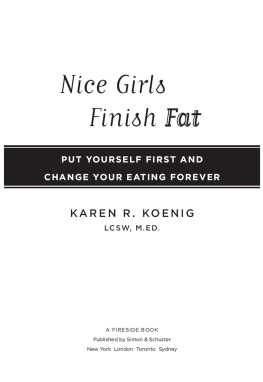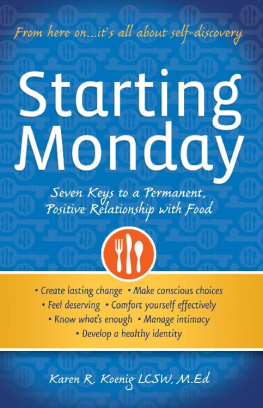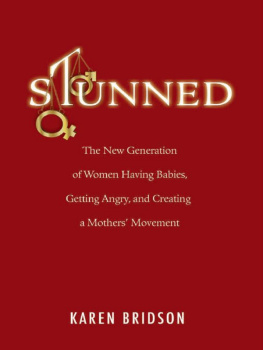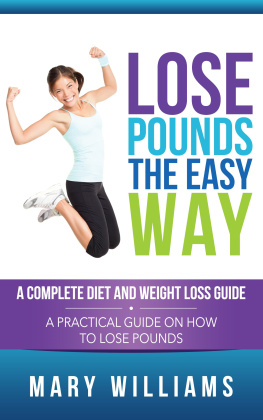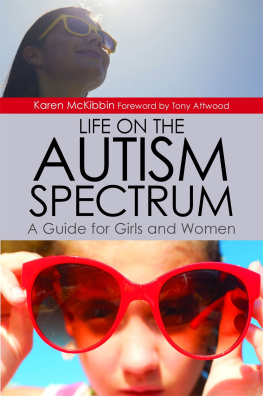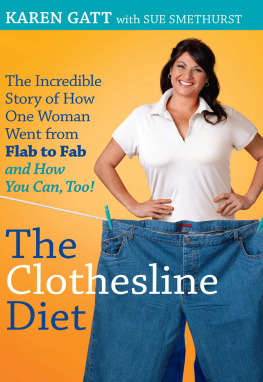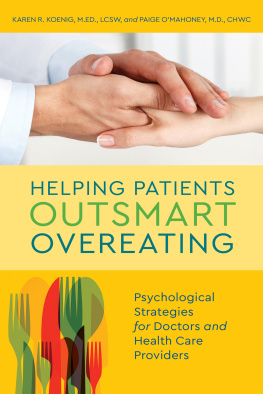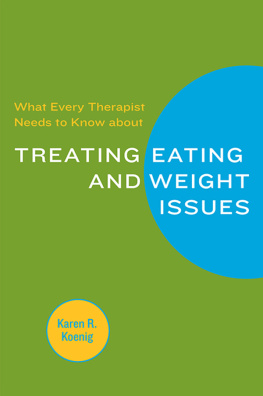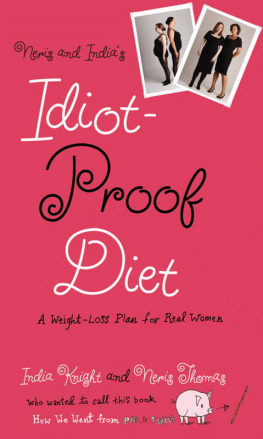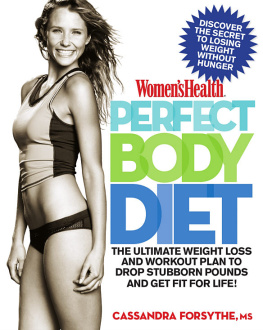I am unbelievably fortunate to spend much of my time engaged in two activities I adoretreating clients in psychotherapy and writing. Therefore, my first burst of gratitude goes to the hundreds of disregulated eaters Ive met and worked with over the years. Whenever Ive gone into a (hopefully unnoticed) funk and felt hopeless about therapy really working to overcome eating and weight problems, youve heartened me with your courage and ability to change and renewed my faith in the process. And, speaking of faith, the second tip of my hat goes to Janice M. Pieroni, my agent, who had faith in me long before I realized I was full of ideas and had enough talent to convert some of them into books. Did I mention her hard work, sense of humor, insight, editing skills, levelheadedness, and nurturing abilities?
Much appreciation goes to Michelle Howry, Senior Editor, Touchstone/Fireside, Simon & Schuster, whose enthusiasm, gentle suggestions, and keen editing eye morphed Nice Girls Finish Fat from a manuscript with potential into a polished, professional piece of work I can be proud of. As always, never-ending thanks goes to my husband for being the man he is.
Introduction: Nice GirlsRead This
How Is Being Nice a Vice?
Weight loss is a marathon, not a sprintand rare is the habitual overeater who goes on a diet, loses twenty or fifty pounds, and coasts slimly through the rest of her days. If staying trim were that easy, Id be out of my psychotherapy job as fast as you could say Nutrishake. Instead of miraculous, overnight, permanent transformation, the stream of women Ive treated for eating and weight problems over the past three decades had to struggle and settle for modest successes in improving their relationship with food and the bodies their aspiring spirits inhabit.
It isnt that they arent motivatedthey are!or that they dont work hard in therapythey do! Their drive to eat normally and lose weight has the focus of a laser. Their diet histories could fill libraries. Theyve read all the weight-loss books, sat through the twelve-step meetings, swallowed the magic pills, and had their stomachs surgically sectioned and stapled. Their stories are unique yet oddly universal. These women have been there and done that and are still searching for the Holy Grail that will grant them peace with the bleeping scale.
As I sit and listen to the play-by-play of their lives, one thing becomes clear. Its not just their dysfunctional childhoods, crummy genetic loading, depression, or anxieties that hold them back from reaching their eating and weight goals. Nor is it their stressful jobs, loopy families, parched lives, or lackluster spouses or partners. What keeps them fat and stuck in the cookie jar, unable to climb out and stay out, is that theyre too damned nice !
They love being nice. I do an exercise in the first session of my Quit Fighting with Food workshop in which I ask participants (who arebig surprisemostly women) to share one thing they like about themselves. And what do most of them say? They beam and tell me theyre nice , of course. Though many are highly educated and skilled, world traveled, at the peak of impressive careers, or have raised children alone with few resources except their own broad shouldersthey continue to believe that their most striking asset is being nice. Not that theres anything wrong with it, as they say on Seinfeld , but come on. It makes me want to cry and shake some sense into them at the same time.
The women I treat are so bernice that theyd not only insist on giving you the blouse off their backs, theyd launder and press it first, wait around for you to put it on, then button it up for you! These kinds of women swell the ranks of the helping professionsteachers, nurses, secretaries, librarians, and (yup) therapistsin part because they are ultranurturing, self-effacing, unselfish, generous, and caring to a fault. The problem is that often their size grows as big as their hearts.
Now, before readers who think Im maligning either nice or fat start to pen me hate mail, let me clear up a few things. There is nothing inherently wrong with being either fat or nice. My goal here isnt character assessment and it certainly isnt character assassination. Au contraire , Ive spent the last thirty years trying to help nice, overweight women stop obsessing about food, get healthy, love their bodies whatever they weigh, and move on with life. My point is that there just might be a correlation between being nice and getting (and staying) fat. The possibility and nature of that link are what this book is about.
Naturally, not every nice woman has eating or weight issuesand every fat female isnt sweet as honey. And, yes, there are nice men who are fat, thin, and in between, along with portly gents who are dear dumplings and others who are boorish brutes. Frankly, from the limited number of overweight men Ive counseled (they dont come to therapy in droves, mind you), Id say the too-nice label fits them like an extralarge glove. In fact, theyre as doggone pleasant and other-centered as the women I treat, so the correlation between chubby and caring might not be a boy-girl thing after all.
However, for the purpose of this book, gender is what its all aboutthe way women are brought up and expected to be nice and how that thrust of socialization straitjackets them in their options, cookie-cutters their personalities, and catapults them headfirst into the Hagen-Dazs. In this culture, even in this day and age, there is a humongous difference between how women and men are raised and treated (never mind the scientific variance of gender genetics), which makes women win the niceness contest hands down.
I know all about it. I was once an overly nice girl turned woman myselfan overweight one, at that. Its not that Im no longer affable and kind or that Ive given up being giving. I havent. But I work extra hard at not striving to be nice for nices sake, as if its the brass ring or an Olympic medal, the one defining word that sums up my entire existence. Ive incorporated a sprinkling of not nice into my personality andwonder of wondersI am still standing. As Ive gotten older, Ive developed this crazy notion I can be anything I want to be, and that includes a giver and taker, a person who elbows herself up to the front of the line when need be and invites folks to step ahead of her just because I feel like it, a woman who finds pleasing herself one of lifes underrated delights, yet who is considered by most people as caring, nurturing, generous, and, yes, downright nice.

